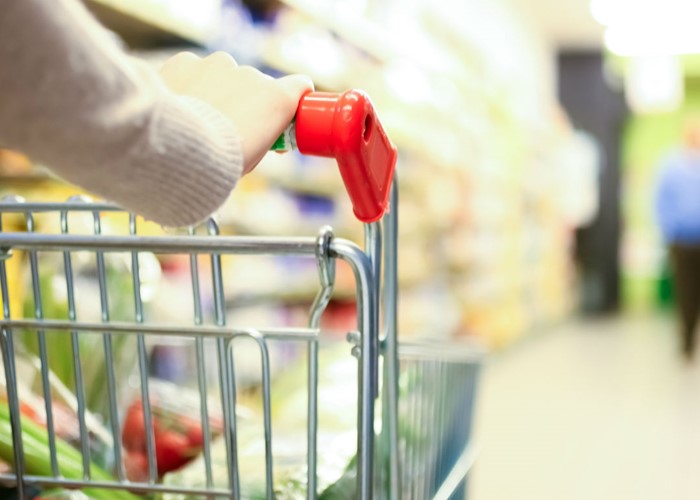Why supermarket bargains are bad for our health (and our money)

Shoppers that fill their trolleys with multibuy deals are at greater risk of a host of health issues, new research suggests. But it is possible to eat healthily and save money, writes John Fitzsimons.
Making the most of the promotional deals at the supermarket may seem like a smart move if you’re looking to save money, but it can actually spell trouble for both your health and your bank balance.
According to new research from Cancer Research UK, if your shopping trolley is filled with items that are on special offer, you’re more likely to be obese.
It found that obesity was almost 30% higher among people from households that bought the most food and drink on special promotions, compared to those that bought the least.
And the people who bought the most special offer items bought 25% more food and drink that was high in fat, salt or sugar, which the researchers suggested was the equivalent to 11 extra unhealthy items a month.
As Professor Linda Bould, a prevention expert at the charity, put it, with a “wealth of tempting yet unhealthy” choices subject to promotional offers, it’s no surprise that people who buy more of these discounted deals are also the most overweight.
Cancer Research called for the Government to introduce more restrictions on the price promotions stores can offer on unhealthy food and drink, though it accepted that there is no single ‘fix’ for the issue.
Get £60 off your first three online Waitrose shops
Why multibuy offers may not save you money
The trouble is, these multibuy offers may not help you to cut the cost of your shopping at all.
A study by consumer champions Which? last year found that a lot of those ‘two for £3’ type deals only appear to be a bargain because the supermarket hiked the product’s price shortly before introducing the offer.
So we actually end up spending even more, buying unhealthy items, and putting both our health and bank balance under strain.
Save money AND eat healthily
While supermarket promotions often focus on food that is high in calories and not exactly great from a nutrition perspective, the reality is that it’s perfectly possible to save money on your grocery shopping without sticking to special offer sausage rolls.
Indeed, some supermarkets make a virtue of how cheap you can get fruit and veg.
Take Lidl for example, which has now rolled out its ‘Too Good To Waste’ boxes across stores nationwide.
The boxes contain approximately 5kg of fruit and vegetables which have become slightly damaged, discoloured or deteriorated, but are still perfectly good to eat, and cost just £1.50.
Aldi is also a good example, with its weekly ‘super 6 promotion’, which features six different fruit or vegetables at a cut price.
Being prepared will also help you save money and avoid being tempted into the ‘discount’ deals - write a shopping list and stick to it, ignoring those ‘end of the aisle’ promotional offers altogether.
Shopping online, rather than in person, can help you sidestep the temptation too, while using MySupermarket will ensure you get your shopping for the least money, as the site compares all of the main supermarkets for you.
And, of course, there's our writer Katy's weekly roundup of the best supermarket deals to help you keep costs down.
The healthy eating facts you shouldn't always believe
The sugar tax
This week actually marks the one year anniversary of the introduction of the sugar tax, a levy imposed on drinks manufacturers for specific products that contain more than 5g of sugar per 100ml.
In most cases, this levy has then been passed onto us as consumers - if we still want to enjoy a particularly sugary drink, like a traditional recipe Coca Cola, then it will fall to us to stump up the extra 18p or so.
It’s notable that while the government expected it to raise more than £500m a year in tax receipts, it slashed this down to £240m in November last year, citing the way that manufacturers had responded to the levy by cutting the sugar content in some of their drinks.
Why being unhealthy will cost you
I have first-hand experience of how unhealthy habits can hurt a bank balance. When I bought my first house, I asked my broker to help me get some life insurance, and the actual quote from the insurer was higher than expected.
My broker explained it in the most diplomatic way possible: “They are concerned by your height/weight ratio.”
In other words, I was overweight and, with the various risks that brings of things like diabetes and strokes, I was therefore a less attractive customer and so would have to pay a higher premium.
It’s not just insurance though – if your weight leads to health conditions, then there will be extra medical costs to account for, while this can lead to time off work, potentially damaging your career prospects and earnings.
An unhealthy diet will cause you to pile on the pounds, but also lose them from your bank balance.
It’s the worst of all worlds, but by being a little bit savvy about your food shopping you can reduce the amount you spend at the till and ensure that you eat a more balanced diet.
Earn rewards on every Waitrose shop with this Partnership card
Comments
Be the first to comment
Do you want to comment on this article? You need to be signed in for this feature